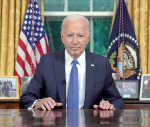You are here
Even within extremism context, gender stereotypes exist — researcher
By Ana V. Ibáñez Prieto - Mar 31,2018 - Last updated at Mar 31,2018
AMMAN — “The portrayal of extremist women in media systematically detaches the perpetrators of any political convictions, attributing their actions to mere emotions and impacting the treatment of their cases in court,” journalist and researcher Victoria Silva said.
Silva's remarks came during a conference on Wednesday at the Cervantes Institute in Amman, where she provided attendees with an overview of her comparative research on reports about women engaged with violent extremism and their male counterparts.
Silva is an independent researcher based in Amman, specialised in international security, extremism and terrorism in the Middle East and North Africa region. She is a contributor at the Spanish Institute for Strategic Studies, and her work has been published at Esglobal, Política Exterior and the academic magazine Relaciones Internacionales, among others.
“The lack of accessible information results in stereotyped treatments in media, accentuating the confusion and lack of comprehension over the phenomenon,” the researcher added.
Regarding the overall picture on global media, Silva noted that “while most extremist men are represented as reasonable individuals who make a decision based on political convictions, women are represented as deviated from their natural role, triggered by emotions and easily manipulated”.
Elaborating on this idea, the researcher identified three main narratives applied to extremist women in media, explaining that the perpetrators of attacks are either represented as “mothers following their protective instinct, so-called monsters affected by mental disorders and driven away from their femininity, or sexually deviated beings manipulated by the men”.
“Triggered by the growing international interest in this phenomenon, media outlets fall victims to a lack of interest in knowing the real causes behind violent extremism perpetrated by women, using different techniques in order to attract the attention of readers and polarise the popular opinion,” Silva continued, noting that such treatment can eventually affect court sentences by misleading on the state of the individual when performing the attack and the reasons behind it.
“The decision whether to engage or not with violent extremism is a complex choice motivated by several factors that vary from one person to another regardless of their gender,” the researcher concluded, highlighting the importance of recognising the perpetrators’ self capacity to decide while constricted by their own specific context.
The issue was also addressed by a recent report issued by the West Asia-North Africa Institute, which found that despite the Daesh terror group's military retreat in the Arab region, many of the drivers that pushed individuals to join the violent extremist group have not been addressed, leading ultra-radical groups to adjust their recruitment techniques accordingly.
Related Articles
AMMAN — “While Internet may play a facilitating role, it is not established that there is a causative link between it and radicalisation tow
AMMAN — Jordan believes in the importance of sustainable development and its role in empowering women and ensuring equal opportunities, Prim
AMMAN — The international conference on the role of media in bridging the gender gap kicked off on Monday, the Jordan News Agency, Petra, re
















